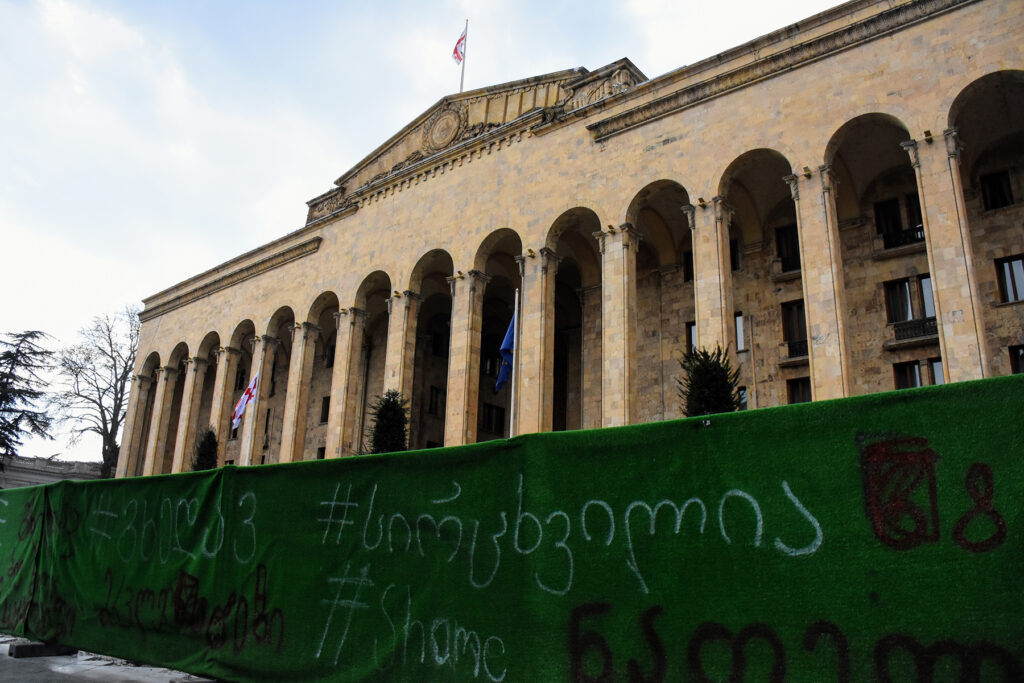Georgian lawmakers have voted in favour of constitutional amendments to change the country’s electoral system to a more proportional one.
In the amendments’ third and final reading on Monday, MPs voted 117 to three in favour of the reforms, just two more than the 115 votes needed.
The bill was supported by the ruling Georgian Dream Party, the opposition Alliance of Patriots, and dozens of independent MPs who have left Georgian Dream since the 2016 elections with various grievances.
Two opposition groups — the United National Movement (UNM) and European Georgia parties boycotted the vote citing an unfulfilled promise to free activist Giorgi Rurua.
The amendments were part of a compromise brokered by Western diplomats in Tbilisi between the government and the opposition following months of protests in Tbilisi.
According to the opposition, the 8 March deal included the release of four anti-government figures including Rurua, although the text of the agreement only referenced a need to ‘address the appearance of political interference in the judicial system’.
Under the new system, the number of MPs elected proportionally through party lists will increase from 77 to 120 while the number of single-member majoritarian constituencies will fall from 73 to 30. During the 2016 parliamentary elections, Georgian Dream won 71 out of 73 majoritarian seats.
The bill guarantees that a party must receive at least 40% of the vote in order to be assigned a majority of seats in parliament. It also implements a 1% vote threshold for a party to enter parliament.
The changes will apply until 2024, when the system is due to change to a fully-proportional one.
The bill has faced 15 weeks of uncertainty, even more so after the authorities rescinded a two-month-long state of emergency on 22 May. The measure to curb the coronavirus outbreak largely froze political life in the country.

The ruling Georgian Dream Party fielded the draft bill on 11 March, three days after Western diplomats brokered the deal between them and a wide spectrum of opposition groups to reform Georgia’s electoral system.
The ‘last political prisoner’ in pre-trial detention
The amendments are a watered-down version of an earlier promise by Georgian Dream to elect all 150 MPs through the party lists. Party Chair Bidzina Ivanishvili made the promise amidst anti-government protests in June 2019 over the invitation of a Russian MP to address parliament.
In a May report, American rights watchdog Freedom House wrote that the changes would have ‘decreased the ruling Georgian Dream party’s chances of winning parliamentary elections again this year’.
Members of the party ultimately rejected the changes in a vote in parliament in November leading to renewed protests and a push to reach the current agreement.
According to opposition groups, the 8 March agreement was more than about electoral changes only. They deemed four people, indicted for different crimes over a period since November, as ‘political prisoners’ that needed to be freed.
These included Besik Tamliani who attended 20 June’s anti-government rally, Gigi Ugulava, one of the leaders of European Georgia, Irakli Okruashvili, a former Defence Minister and opposition leader, and Giorgi Rurua, a supporter of last year’s anti-government protests.

[Read more on OC Media: Dispute over ‘political prisoners’ put Georgia’s electoral reforms in doubt]
While Georgian Dream insisted there was no political prisoner in the country, by the time of the final vote, Besik Tamliani had been released on bail while Ugulava and Okruashvili were pardoned on 15 May by Georgian President Salome Zurabishvili.
Giorgi Rurua was charged for illegal arms possession several days after Georgian Dream voted down their own bill to reform the electoral system last November.
He has maintained that police planted a gun on him and that his prosecution was politically motivated. Several MEPs and US lawmakers have openly supported Rurua’s release citing the 8 March agreement.
In the run-up to Monday’s vote, Rurua was actively portrayed by Georgian Dream, groups critical of the previous government, and by family members of his alleged victims as the leader of an organised criminal group active in the early 1990s that committed killings and kidnappings.
Rurua, who was never charged for these alleged crimes, also owns 2.5% of the newly founded opposition-leaning TV company Mtavari Arkhi.




 29 June 2020
29 June 2020



